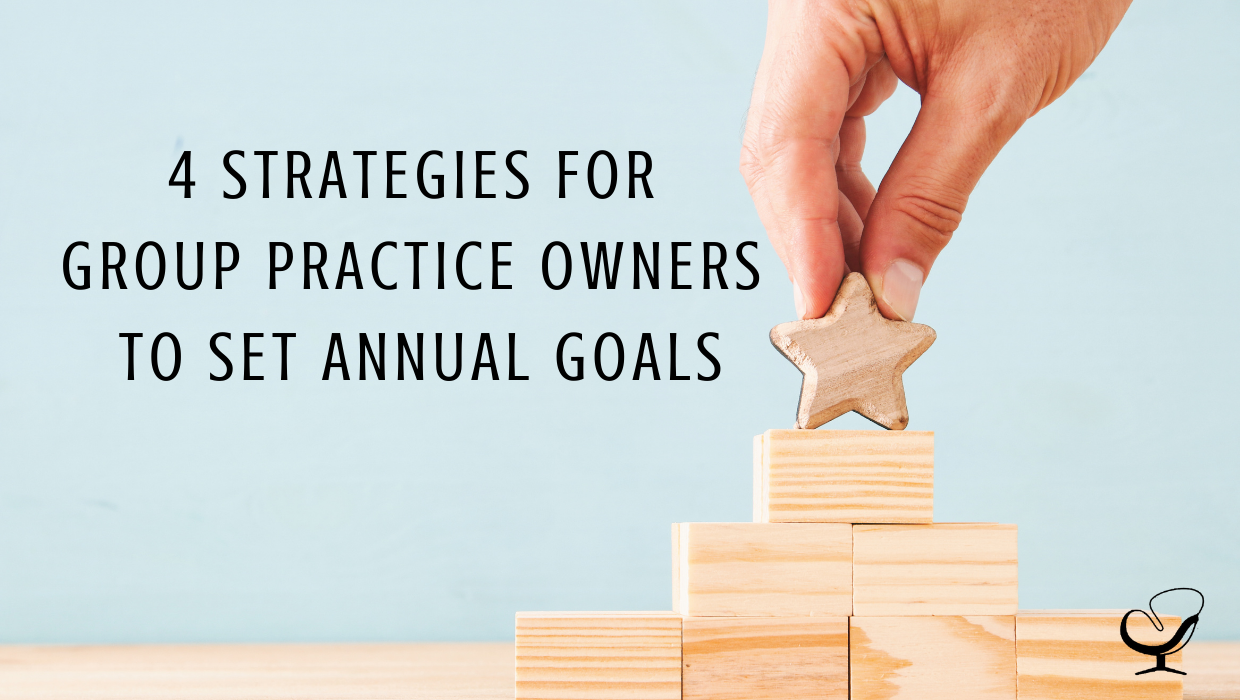When it comes to strategies for group practice owners I know that you have many questions and ideas.
Do you often feel confused about where you want to go and what you want your group counseling practice to accomplish over the next year?
Or, perhaps you have so many ideas and plans that it feels overwhelming to even find a starting point?
Maybe setting annual group practice goals is scary, frustrating, or so ambiguous that you’ve never done it before?
However, there is a way to make setting annual goals easy, and here are 3 strategies for group practice owners to get you to that point:
4 Strategies for Group Practice Owners
Strategy 1: Align Your Goals with Your Vision, Mission and Values
Keep in mind your vision, mission and values for your group practice when you’re creating your goals. I usually write these things down at the very top of my Goals sheet so I can easily double-check whether each goal I create is in alignment with my group practice’s vision, mission and values.
For example, if one of your practice’s values is to provide services to an under-served population, you may want to include goals on how to reach that population or offering limited sliding fee scale slots to that population.
Strategy 2: Keep It Simple
When setting group practice goals for the New Year, you don’t need to create a complicated template of set-in-stone goals. All you need is a piece of paper or a computer document of some sort that lists numbers 1-5 to get started – and some time to brainstorm and think.
Set a time for 30-60 minutes and just get started. I’d suggest creating between 3-5 goals for your practice at a time and no more, as more than 5 goals can get overwhelming pretty easily. Start with big, overarching goals that you want to achieve, such as find new office space, get off 2 insurance panels, or hire 3 new therapists.
Strategy 3: Create Small Steps and Timelines
After you’ve listed your 3-5 goals for the year, then write down every step that you (or someone else) need to in order to reach that goal. If your goal is to hire 2 new therapists in the next year, what are steps 1-10 that you need to do to make this happen?
Then add in your timelines for each goal. If you are very detail-oriented, you can add in timelines for each step, but this might not work for everyone. Remember to make your timelines realistic based on your skillset and your time available to reach the goal.
Strategy 4: Review Your Goals Monthly or Quarterly
You want to make your Goals a working document, that you can change and adapt as your priorities and opportunities change. Make sure you set aside time on a quarterly basis at the minimum, ideally monthly, to really review your goals and identify where you’re at. It is important to review your goals
Your Goals document can help keep you on track to make some pretty big accomplishments over the next year, but it’s only as good as you make it. If you set up everything initially but then completely forget to refer back to it, it’s likely that you’ll find yourself off-course from your vision for your group practice sometime in the next year, floundering and wondering what your next step should be.
Have you set your goals yet for the next year? If so, great! If not, there’s still a lot of time to do this. I guarantee that you won’t feel worse after you do it, and it may help you hone in on your priorities and not feel as overwhelmed for the next several months!
Previous Articles by Shannon Heers
How to Get Through the Holidays as a New Group Practice Owner
Setting Up Your Group Practice Website
How to Find Good Therapists to Hire for Your Group Practice
How to Hire Your First Therapist When You’ve Never Hired Before
Don’t Settle When Hiring Clinicians
Shannon Heers
 Shannon Heers is a licensed professional counselor in Colorado. She owns the private-pay group practice Catalyss Counseling in the Denver metro area, focusing on helping adults manage their anxiety, grief, and trauma. Shannon is also an experienced clinical supervisor and manager who offers business consultation services to other therapists. She balances working with raising her two young children.
Shannon Heers is a licensed professional counselor in Colorado. She owns the private-pay group practice Catalyss Counseling in the Denver metro area, focusing on helping adults manage their anxiety, grief, and trauma. Shannon is also an experienced clinical supervisor and manager who offers business consultation services to other therapists. She balances working with raising her two young children.
Group practice ownership is daunting but can be done easily if you do your homework, prepare, and learn all you can about the process!

